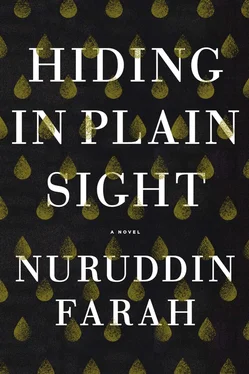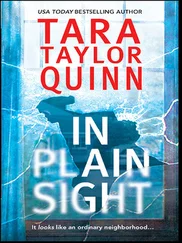At seven, she noticed he was looking ravenous. She took him to the Carnivore, where he ordered a plateful of meats — beef, ostrich, and hippo — which, according to him, had been cooked to perfection; in fact, he suggested she try it. Since she found the idea of a restaurant making an offer of some sixty types of meat revolting, and she had only a salad, there was a moment when she felt ambivalent toward a man who could bear to consume so much meat — and she thought maybe she should terminate her interest in him. But there was a strong feeling toward him and she stayed with him, paid the bill, and he took the rest of the food in a doggy bag, maybe because he could live on it for a few days, given that his salary as an NGO employee wasn’t high.
They jumped into a taxi and she took him back to her hotel, still uncertain whether she wanted anything more than a nightcap with him. But he was still handsome and young, and she was lonely, and when they got to the lobby, she took him up to her room and they made love.
The sex this time was scarcely better than the first. As a lover, Ngulu clearly was no Humboldt. Unhandsome as the sculptor was, rough in manner and uncouth in his comments, Humboldt lived for sex and art. Ngulu has no strong ambition of any sort. Moreover, he fell asleep soon after the evening’s one and only round of lovemaking, stirring only to spread his legs, raise his pelvis, and release a silent malodorous fart then yawning and stretching his limbs one at a time, all the while remaining asleep. And his penis is small. Still, Bella longs to see him. For the first time, she admits to herself that she admires him for what he is: a youthful angel of extraordinary beauty. And with Salif and Dahaba away, what is the harm? If she plays her cards right, she will get what she wants and still have a delicious evening to herself.
And yet she can’t help thinking about the questions Fatima asked about Aar and his attraction to Valerie. What would make an intelligent, loyal, loving, and attractive man link himself to such a woman? “What does he/she find in him/her?” is a question asked the world over. And the answer is “Nobody knows.” Still, she would not marry a man like Ngulu or have children by him. But knowing what she knows about the pull he nevertheless exerts on her, she is more generous toward Aar for having chosen Valerie and by extension toward Valerie, despite all her failings.
Stalled in traffic, she glances in the mirror, unable to decide whether she is any the worse for wear. But what about Ngulu? She wonders if experience has made him any better as a lover. Although the pay for NGO workers like him is modest, the demand for a handsome companion like him is high among the many unattached British, European, and North American female employees, for whom there are few good marriageable men. She is familiar with some of these women, including a former classmate from university she sometimes stays with when she is traveling. In fact, it is that classmate who told her that Ngulu had been taken up by a Canadian woman old enough to be his grandmother, a sugar mummy of exceptional stature, quite literally — a redhead more than six feet tall, with a voice as many-tempered as Paul Robeson’s. How does he address this elderly Amazon, she wonders—“Sweetness”?
Thinking of the unhappiness in his voice just now, she wonders again whether she should have canceled. The idea of being taken for granted makes her uncomfortable. And truly, it is time the man figures out what he wants in life and moves on. She will impress this upon him, she thinks. And at any rate, it is too late to cancel; a few minutes later, she is at the hotel.
—
He is waiting for her in the back of the café bar, just as he said he would be. And if Bella needed confirmation of her feelings, she gets it as she approaches him — his exquisite features no longer stir things up in her, which is how she used to describe his particular appeal to herself. He is like the favorite toy a child holds close to him for years as he falls asleep, touching, kissing, and holding it, drawing physical comfort from it. And now, it seems, the toy is broken or she has tired of it.
But as she comes closer, she sees that he seems eager indeed. He is up on his feet and waving enthusiastically to her. He takes a few steps toward her, meeting her before she reaches the table. They embrace awkwardly, and when their lips meet, his mouth is open and wet, in a more intimate kiss than she is prepared for. She frees herself quickly, saying, “Okay, okay, okay.” She allows him to lead her by the hand back to his table. He’s been drinking. There is an almost empty whiskey glass — not his first, she guesses — and a couple of empty beer bottles and a can of Coke.
“How have you been doing?” she asks.
“I’ve been doing very well, thank you.”
Bella squirms. She flags down the waiter. Ngulu orders another whiskey with ice, and then the waiter turns to her.
“What about you, madam? What can I get you?”
She says, “I have had a long day, and a longer night is waiting for me. Please get me a bottle of mineral water with a slice of lemon.”
When the waiter leaves, Ngulu takes the hand closest to him and, with a smile in his eyes, says, “Good. A very long night, I like it.”
She doesn’t even bother trying to set him straight.
He says, “My sincere condolences for your loss. Often, I ask myself what this world is coming to. Innocent people getting killed when they are just going about their business and working for an honest living.” He shakes his head and tells her about some of the casualties they’ve suffered in Nairobi at the hands of terrorists acting in the supposed name of religion, nationalism, or ethnic loyalty.
“And did you lose any friends or family in one of those incidents?” she asks.
He shakes his head, but says, “We’re all affected by it, every one of us.”
She knows that a million and a half Kenyans lost their lives in such violence around the elections a couple of years ago, and close to three million joined the ranks of the internally displaced. But she is in no mood to hear her specific, personal loss glibly lumped in with so many others. Granted, she agrees that in a general sort of way we are all affected at least momentarily by the footage of a bomb blast and the grisly carnage that results. But that is no different from coming across the collision of two vehicles in which passengers have died or been injured. We drive with extra caution for another kilometer or two then return to our habitual careless ways. Only when we are affected personally, when a family member or close friend loses his or her life, do we really feel the pain and cruelty in our guts, in the marrow of our bones. That is why in Somalia people pray that God spares those one loves while taking those one does not even know.
The waiter brings their drinks and then tots up their bill, scribbling the total and leaving it on the table.
“How are Aar’s children faring?” Ngulu asks.
“They’re having a difficult time,” Bella says.
“They go to school here, right? In the suburbs?”
Bella is not inclined to give him any more information than she needs to. She senses that their relationship is dying a natural death, although she is not sure this is the right moment to end it definitively. She will bide her time. What is the rush?
Ngulu asks, “Have you a plan for this evening?”
“I am planning for a very long night.”
“With me, I hope.”
“And what do you have in mind?”
He brings out a room key. “This is the plan I have in mind. I’ve paid for a suite for the night where I hope we will frolic and love and remember.”
Bella’s gaze shifts from the room key he has shown her to the mineral water, which she has not even touched. She weighs her words carefully before she speaks. She knows that she is in a more privileged position than the vast majority of women. She is economically independent, she has a profession in which she is well respected, she knows what she is passionate about, and she has friends on whom she can rely. Most important, she is not beholden to any man. She has had the run of her own affairs for much of her life, and it is not only in her nature but also in her means to withdraw unequivocally from any situation where she is not treated with the dignity she deserves. Life is tough on women, and Bella thinks she has been well prepared for it. If, as Sophie Tucker is thought to have said, a woman needs good looks between ages eighteen and thirty-five, a good personality from thirty-five to fifty-five, and plenty of cash thereafter, Bella has had all that she needs to make herself happy with her lot. So why should she permit this boy toy to behave badly toward her?
Читать дальше












